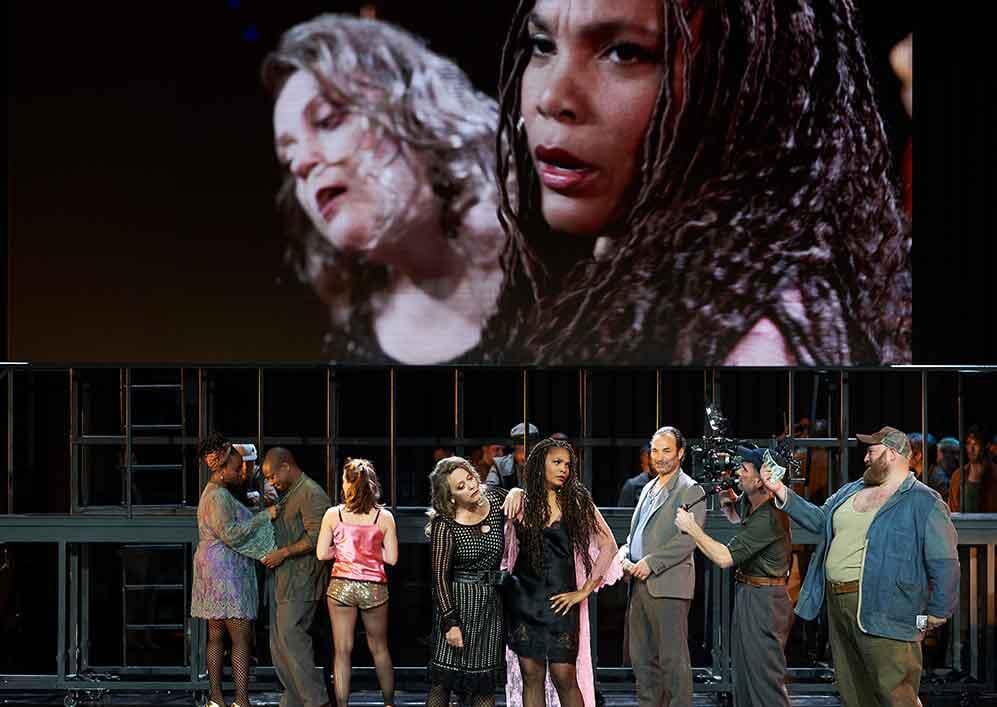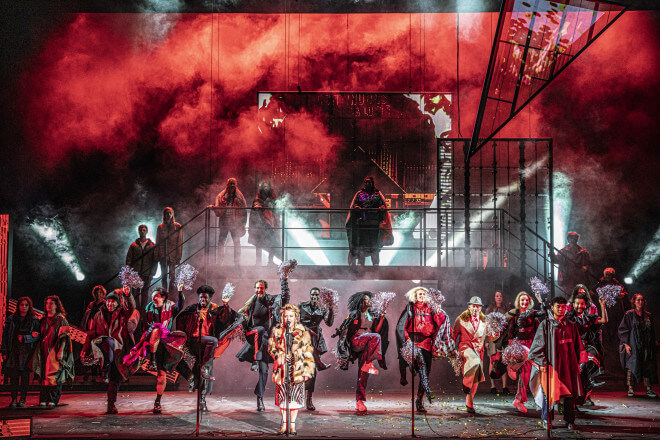The Chemnitz Opera House hosted opening ceremonies for the Weill centenary immediately preceding the premiere of Der Weg der Verheissung on 13 June 1999. Professor Guy Stern, Secretary of the Board of Trustees of the Kurt Weill Foundation for Music, introduced distinguished speakers including Dr. Richard von Weizsäcker, former President of the Federal Republic of Germany; Professor Dr. Hans Joachim Meyer, Saxony’s Minister for Arts and Sciences; Dr. Peter Seifert, Mayor of Chemnitz; and Professor Kim H. Kowalke, President of the Kurt Weill Foundation. The international array of guests joined in a centenary toast given by Dr. Peter Hanser-Strecker, President of Schott Musik International.
Der Weg der Verheissung
The world premiere of Der Weg der Verheissung in Chemnitz, Germany, on 13 June culminated two years of planning by its co-producers: Oper Chemnitz, the Brooklyn Academy of Music, the New Israeli Opera, and Opera Kraków. A cast of more than 200 filled the multi-level stage of the Chemnitz Opera House, in a production crafted by an international team consisting of John Mauceri, conductor (USA), Michael Heinicke, director (Germany), and David Sharir, designer (Israel). On commission from Meyer Weisgal in 1934, Weill, Franz Werfel, and Max Reinhardt created a monumental musical spectacle combining dramatized readings from the Torah with the story of a Jewish congregation on the eve of a pogrom. The full work had never been performed in its original German language version, although a shortened version entitled The Eternal Road was presented in New York in 1937. The centenary production will be seen around the world. After a Chemnitz revival in November 1999, the production will travel to the Brooklyn Academy of Music in New York (February-March 2000), the New Israeli Opera in Tel Aviv (April 2000), and Kraków (dates TBA), as well as participating in the German Pavilion at EXPO 2000 in Hannover (July 2000).
Writing of the premiere, the reviewer in the Stuttgarter Zeitung concluded: “An evening in the theater, as moving as it is disturbing, that strikes one speechless in the end: that is Der Weg der Verheissung.” The New York Times columnist called the work “a powerful visual spectacle” and went on to say: “Just as the story builds to an emotional climax, so does Weill’s score grow in strength as the drama unfolds. At times, the music is rich in references to Don Giovanni, to Nabucco, to Wagner and Mahler, even to Weill’s own rendering of American Jazz but it also takes on a grandeur of its own.”
Die Bürgschaft
In Charleston, SC, Spoleto Festival USA’s production of Die Bürgschaft (30 May – 12 June 1999) served as the North American curtain raiser for WEILL 2000. Die Bürgschaft is Weill’s most ambitious opera, removed from the stage by a Nazi campaign even though critics of the time hailed it as a new starting point for German opera. After initial productions in 1932, the work had been staged only twice in Berlin in 1957 and in Bielefeld in 1998 before the North American premiere in Charleston. Spoleto’s production was conducted by Julius Rudel and directed by Jonathan Eaton (who had staged the Bielefeld production) and featured vivid contributions from baritones Frederick Burchinal and Dale Travis as Mattes and Orth. Writing about the production, the reviewer for the Wall Street Journal called Die Bürgschaft “a stunning work that knits together Weill’s intense social and political concerns with compositional skill and invention of the highest order.” A recording of the Spoleto production will be released on CD in early 2000.


